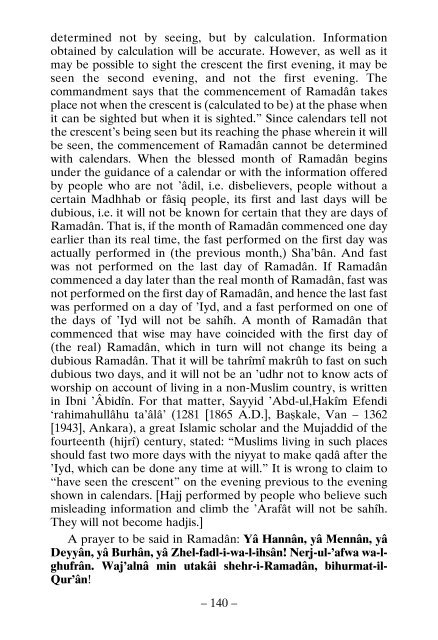O Son !
THE BOOK ‘O SON’ Al-hamdu lillâhi Rabbil ’âlamîn. Wa-s-salâtu wa-s-salâmu ’alâ Rasûlinâ Muhammadin wa Âlihi wa Sahbihi ajma’în. 1– O son! Collecting from books written by the scholars of the Hanafî Madhhab three hundred and sixty hadîth-i-sherîfs and forty-four khabars and also the seven essentials and the five rukns and the seven wâjibs and the fourteen sunnats and the twenty-five mustahabs and the fourteen mufsids of namâz, I have explained them for you. Adapt your acts and deeds to these teachings so that you attain fayz and nejât (salvation)! 2– Also for your information, I have collected a thousand and ninety âdâb (adabs) for you and for other young Muslims like you. If you adapt your actions and acts of worship to these teachings, they will be sufficient for you. If you laze, disobey Allâhu ta’âlâ and cease from these practices and manners, you will be afflicted with slavery and disgrace in the world and subjected to torment in the world to come. If you live up to them and advise your Muslim brothers to do the same, it will be useful for you. They will say blessings over you. And Haqq ta’âlâ will accept their invocations. For, a slave will be pardoned on account of another slave’s invocations for them.
THE BOOK ‘O SON’
Al-hamdu lillâhi Rabbil ’âlamîn. Wa-s-salâtu wa-s-salâmu ’alâ
Rasûlinâ Muhammadin wa Âlihi wa Sahbihi ajma’în.
1– O son! Collecting from books written by the scholars of the
Hanafî Madhhab three hundred and sixty hadîth-i-sherîfs and
forty-four khabars and also the seven essentials and the five rukns
and the seven wâjibs and the fourteen sunnats and the twenty-five
mustahabs and the fourteen mufsids of namâz, I have explained
them for you. Adapt your acts and deeds to these teachings so that
you attain fayz and nejât (salvation)!
2– Also for your information, I have collected a thousand and
ninety âdâb (adabs) for you and for other young Muslims like you.
If you adapt your actions and acts of worship to these teachings,
they will be sufficient for you. If you laze, disobey Allâhu ta’âlâ
and cease from these practices and manners, you will be afflicted
with slavery and disgrace in the world and subjected to torment in
the world to come.
If you live up to them and advise your Muslim brothers to do
the same, it will be useful for you. They will say blessings over you.
And Haqq ta’âlâ will accept their invocations. For, a slave will be
pardoned on account of another slave’s invocations for them.
You also want an ePaper? Increase the reach of your titles
YUMPU automatically turns print PDFs into web optimized ePapers that Google loves.
determined not by seeing, but by calculation. Information<br />
obtained by calculation will be accurate. However, as well as it<br />
may be possible to sight the crescent the first evening, it may be<br />
seen the second evening, and not the first evening. The<br />
commandment says that the commencement of Ramadân takes<br />
place not when the crescent is (calculated to be) at the phase when<br />
it can be sighted but when it is sighted.” Since calendars tell not<br />
the crescent’s being seen but its reaching the phase wherein it will<br />
be seen, the commencement of Ramadân cannot be determined<br />
with calendars. When the blessed month of Ramadân begins<br />
under the guidance of a calendar or with the information offered<br />
by people who are not ’âdil, i.e. disbelievers, people without a<br />
certain Madhhab or fâsiq people, its first and last days will be<br />
dubious, i.e. it will not be known for certain that they are days of<br />
Ramadân. That is, if the month of Ramadân commenced one day<br />
earlier than its real time, the fast performed on the first day was<br />
actually performed in (the previous month,) Sha’bân. And fast<br />
was not performed on the last day of Ramadân. If Ramadân<br />
commenced a day later than the real month of Ramadân, fast was<br />
not performed on the first day of Ramadân, and hence the last fast<br />
was performed on a day of ’Iyd, and a fast performed on one of<br />
the days of ’Iyd will not be sahîh. A month of Ramadân that<br />
commenced that wise may have coincided with the first day of<br />
(the real) Ramadân, which in turn will not change its being a<br />
dubious Ramadân. That it will be tahrîmî makrûh to fast on such<br />
dubious two days, and it will not be an ’udhr not to know acts of<br />
worship on account of living in a non-Muslim country, is written<br />
in Ibni ’Âbidîn. For that matter, Sayyid ’Abd-ul,Hakîm Efendi<br />
‘rahimahullâhu ta’âlâ’ (1281 [1865 A.D.], Başkale, Van – 1362<br />
[1943], Ankara), a great Islamic scholar and the Mujaddid of the<br />
fourteenth (hijrî) century, stated: “Muslims living in such places<br />
should fast two more days with the niyyat to make qadâ after the<br />
’Iyd, which can be done any time at will.” It is wrong to claim to<br />
“have seen the crescent” on the evening previous to the evening<br />
shown in calendars. [Hajj performed by people who believe such<br />
misleading information and climb the ’Arafât will not be sahîh.<br />
They will not become hadjis.]<br />
A prayer to be said in Ramadân: Yâ Hannân, yâ Mennân, yâ<br />
Deyyân, yâ Burhân, yâ Zhel-fadl-i-wa-l-ihsân! Nerj-ul-’afwa wa-lghufrân.<br />
Waj’alnâ min utakâi shehr-i-Ramadân, bihurmat-il-<br />
Qur’ân!<br />
– 140 –

















